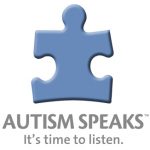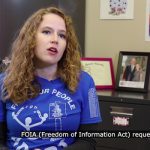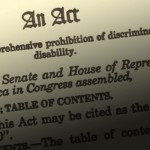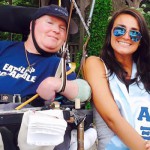
Posted on April 28, 2017
Walking through UD’s Trabant student center early this month, I saw a few student protestors standing next to an information table staffed by a campus chapter of Autism Speaks. The protestors’ signs read, “Autism Speaks doesn’t speak for me” and “Before you donate consider the facts.” I got excited at the sight of a little political activism in relation to disability issues on our campus, and eagerly wanted to join in.
With the protestors.
Many people wanting to help

Posted on November 22, 2016
More than a month after Donald Trump defeated Hillary Clinton, the disability community shows little sign of letting go of its grief and fear and no wonder.
In Clinton, the community heard a candidate who took turns applauding people with disabilities (they’ve “changed things for the better in our country”) and advocating for them (they’re “too often invisible, overlooked and undervalued”).
She promoted a plan designed to push states to require health coverage for autism services in private insurance plans,
This entry was posted in autism, civil rights, community living, developmental disabilities, diversity, employment, inclusion, people with disabilities, physical disabilities, politics, public policy, subminimum wage, transportation, Uncategorized and tagged American Association of People With Disabilities, Barack Obama, Bill Clinton, disability community, Donald Trump, Hillary Clinton, IDEA funding, Individuals with Disabilities Education Act, National Council on Independent Living, New York Times, Rehabilitation Act, Serge Kovaleski.

Posted on October 27, 2016
I thought I understood the issue of employment for people with disabilities, until I watched Bottom Dollars, a new documentary from Rooted in Rights and filmmaker Jordan Melograna, which revealed to me how little I actually knew.
The film will likely have the same revelatory effect on you – should you attend a free showing of Bottom Dollars at UD’s Center for Disabilities Studies on Nov. 4 at noon. And don’t be surprised if the film spurs you to action,
This entry was posted in accessibility, authentic community integration, Center for Disability Studies, civil rights, community living, employment, inclusion, people with disabilities, public policy, sheltered workshops, subminimum wage, Uncategorized and tagged Bottom Dollars, Fair Labor Standards Act, Good WIll, individualized transition plans, Rooted in Rights, sheltered workshops, subminimum wage.

Posted on October 13, 2015
Now that the ballyhoo behind the silver anniversary of the Americans with Disabilities Act has died down, please allow me (with considerable regret – believe me) to voice this uncomfortable truth: The ADA, landmark legislation though it is, capable at any turn of protecting the rights of people with disabilities, continues to spawn negative consequences.
As Dr. Ronald Meinert and Francis K. O. Yuen noted in their book, “Controversies and Disputes in Disability and Rehabilitation,” the ADA trivializes real
This entry was posted in accessibility, Americans with Disabilities Act, civil rights, community living, employment, inclusion, people with disabilities, transportation, Uncategorized and tagged ADA, Americans with Disabilities Act, Bragdon v. Abbott, challenging disabilities, Dr. Ronald Meinert, Francis K. O. Yuen, invisible disabilities, marginal disabilities, non-competitive jobs, U.S. Supreme Court, vocational rehabilitation.

Posted on July 1, 2015
What constitutes “community living?” There’s the sense, not just in Delaware but across the country, that battle lines have been drawn between those espousing opposing perspectives on this matter. On one side are those who celebrate the victories of the ADA, and the Supreme Court’s Olmstead decision, and the countless state and local efforts to ensure that people with disabilities have the right to be—and actually are—fully included in their communities. In education, employment, housing, transportation, recreation … in, a
This entry was posted in authentic community integration, Center for Independent Living, civil rights, community living, Down syndrome, inclusion, people with disabilities and tagged Artfest, Center for Disabilities Studies, Centers for Medicare and Medicaid Services, CLSC, CMS rule, Community Connectors, The Delaware Way.






